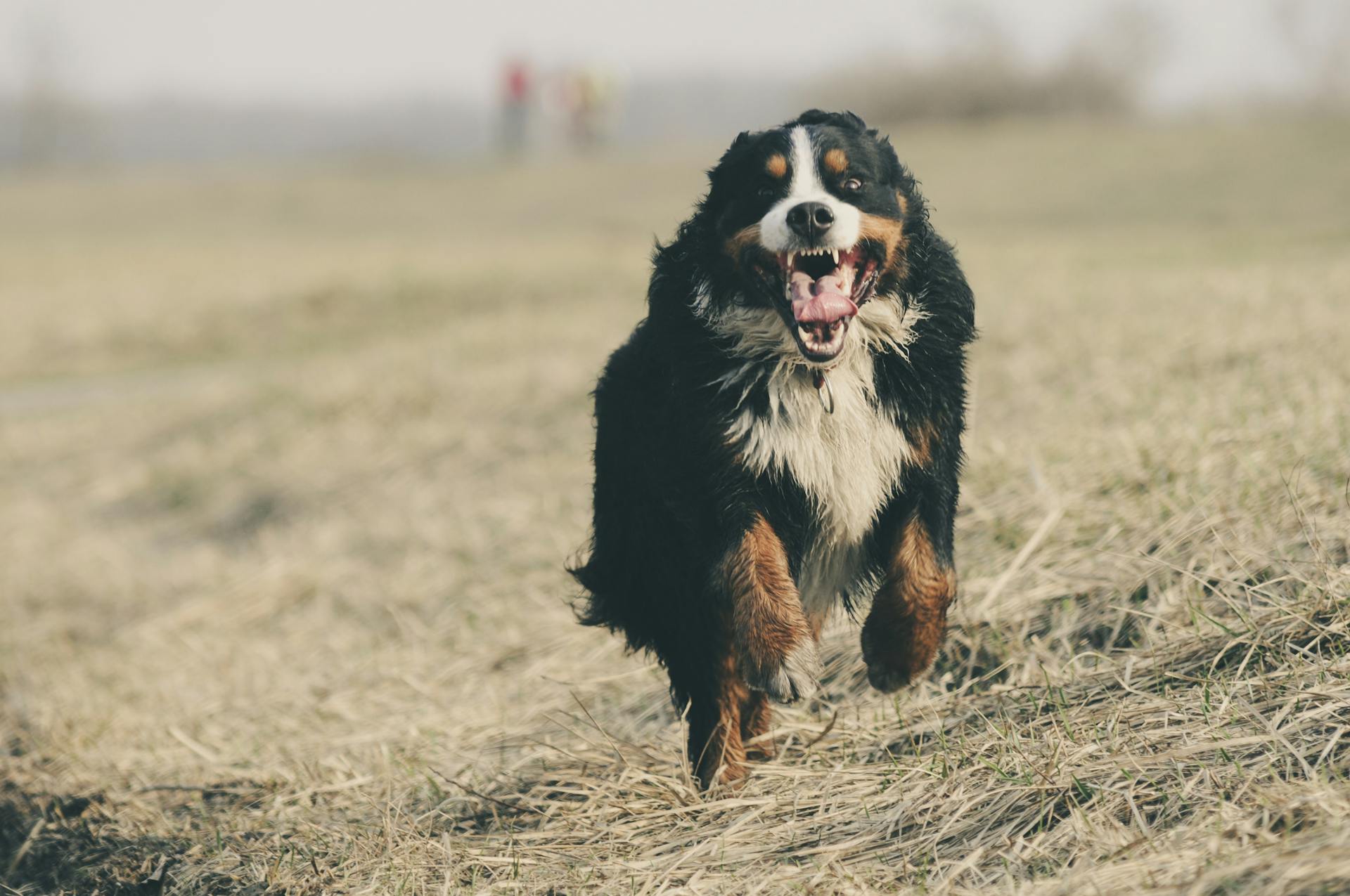
Running with a Bernese Mountain Dog can be a wonderful experience, but it's essential to consider the breed's unique characteristics to avoid injury. Bernese Mountain Dogs are prone to joint issues due to their large size and weight.
Regular exercise is crucial for Bernese Mountain Dogs, and running can be a great way to provide this. However, it's crucial to start slowly and gradually increase the distance and intensity to avoid putting excessive stress on their joints.
Bernese Mountain Dogs can weigh between 80-120 pounds, which can put a lot of strain on their joints, especially their hips and knees. This makes it essential to be mindful of their body language and watch for signs of fatigue or discomfort.
A study found that Bernese Mountain Dogs are more likely to suffer from hip dysplasia, a condition that can lead to arthritis and mobility issues.
Take a look at this: Bernese Mountain Dog Issues
Common Canine Health Issues
Bernese Mountain Dogs are prone to several health issues that can affect their quality of life.
One of the most significant health concerns for Bernese Mountain Dogs is canine cancer, with up to 50% of them dying from the disease. Early detection is key to treating cancer in Bernies.
Hip and elbow dysplasia are also common issues in Bernese Mountain Dogs, due to their large size. Regular monitoring of their mobility is crucial to catch these problems early.
Osteoarthritis, or arthritis, is another significant concern for Bernies, often caused by joint problems. Using joint supplements as a preventative measure can help keep their joints healthy.
Hip dysplasia, elbow dysplasia, and osteochondrosis are all joint-related issues that can be costly to diagnose and treat, with prices ranging from $1,500 to $6,000.
To protect yourself from expensive vet bills, it's essential to purchase pet insurance for your Bernese Mountain Dog before they show symptoms or are diagnosed.
A reputable breeder will be honest and open about health problems in the breed and the incidence with which they occur in her lines. Ask the breeder to show evidence that both of a puppy's parents have hip and elbow scores of Excellent, Good, or Fair from the Orthopedic Foundation for Animals or OVC or PennHIP scores.
On a similar theme: Hip Dysplasia Bernese Mountain Dog
Protection and Prevention Key to Health
Bernese Mountain Dogs are typically active and healthy most of their lives, but to keep them that way, it's essential to take preventative measures.
The key health problems to watch out for are joint-related, so plan to protect and strengthen your Bernese's joints safely and naturally by adding a joint supplement to their diet. Most dogs need joint supplements by age 8, but since Bernese Mountain Dogs have a shorter life expectancy, they should begin taking joint supplements even earlier.
To promote joint health and cartilage development, consider adding a joint supplement that contains Glucosamine and Chondroitin to your Bernese's diet. This can help keep them active and youthful for longer.
Here are some common health issues to be aware of:
Early detection and treatment are crucial in preventing these health issues from becoming more severe. Regular veterinary check-ups and monitoring your Bernese's mobility can help identify any potential problems early on.
Healthy Living
To keep your Bernese Mountain Dog healthy and happy, it's essential to maintain a healthy weight through regular exercise. They love to be outside and hike long distances, so make sure to keep them active and busy.
Their great endurance makes them perfect for active families who enjoy outdoor activities. This also means they need plenty of opportunities to run around and get some exercise.
The typical Bernese life span is only seven years, although a few live to be 10 or older. This means you want to prioritize their health from an early age.
Take your Berner to your veterinarian soon after adoption to spot any visible problems. Your veterinarian will also work with you to set up a preventive regimen to avoid many health issues.
Regular check-ups with your veterinarian can help watch out for the early signs of diabetes and skin problems, including ear infections. This can help prevent or manage these conditions.
Make sure you have a good contract with the seller, shelter, or rescue group that spells out responsibilities on both sides. This will help protect you and your new furry friend.
Curious to learn more? Check out: Bernese Mountain Dog Eye Problems
Traits and Behavior
Bernese Mountain Dogs are large and sturdy, with adults weighing between 80-120 pounds and standing 23-27 inches tall at the shoulder. They are built for endurance, not speed, which affects their running ability.
Their calm and gentle nature makes them a great companion, but this also means they may not be as motivated to run as some other breeds. They can be prone to overexertion, especially in hot weather.
Their thick double coat requires regular grooming to prevent matting and tangling, which can be a challenge for runners who are short on time.
Protection Key to Health
Protection is a crucial aspect of maintaining a Bernese Mountain Dog's health. The good news is that Bernese Mountain Dogs are typically active and healthy most of their lives.
Regular veterinary check-ups are essential to detect any potential health issues early on. This will help prevent problems from becoming serious.
A balanced diet is also vital for keeping your Bernese in top shape. Protecting them from obesity by monitoring their food intake is key.
Keeping your Bernese on a regular exercise routine will also help prevent health issues. This includes daily walks and playtime, which will keep them physically and mentally active.
Traits and Behavior

Traits and Behavior are essential aspects of human nature, and understanding them can help us navigate our relationships and interactions with others.
Research suggests that humans have a unique combination of traits that shape their behavior, such as extraversion and neuroticism. These traits can influence how we interact with others and how we respond to stress.
Extraversion, for example, is associated with being outgoing and sociable, while neuroticism is linked to anxiety and emotional instability. People with high levels of extraversion tend to have larger social networks and are more likely to take risks.
Neuroticism, on the other hand, can lead to increased anxiety and stress, which can negatively impact relationships and overall well-being. People with high levels of neuroticism may also be more likely to experience mood swings and emotional instability.
Understanding these traits and their impact on behavior can help us develop more effective communication strategies and build stronger relationships. By recognizing and adapting to the unique traits and behaviors of others, we can create a more harmonious and supportive social environment.
Dog Agility Test
The Bernese Mountain Dog is surprisingly speedy, with some individuals reaching speeds of up to 25.51 mph in the Fast CAT Races.
Their average speed is 20.8 mph, which is quite impressive considering their large size.
The fastest Bernese Mountain Dog on record, Wagontale’s Exclusive Design CD BN RA OJP, achieved this speed in a Fast CAT Race.
Male Bernese Mountain Dogs tend to be slightly faster than females, with an average speed of 21.3 mph compared to 20.5 mph.
Even the slowest Bernese Mountain Dog on record, which ran at 11.95 mph, is still a respectable speed for a large breed.
For another approach, see: How Fast Do Boxer Dogs Run
Frequently Asked Questions
How many hours of exercise does a Bernese Mountain Dog need?
A Bernese Mountain Dog requires 1 to 1.5 hours of daily exercise to stay happy and healthy. Regular physical activity can include walks, playtime, and engaging in activities like hiking or swimming.
Sources
- https://blog.parnell.com/en-us/bernese-mountain-dogs-a-big-beautiful-arthritis-risk-breed
- https://www.embracepetinsurance.com/dog-breeds/bernese-mountain-dog
- https://bernesewa.com.au/breed-info/is-this-breed-for-you/
- https://pets.stackexchange.com/questions/31689/bernese-mountain-dog-that-is-skittish-and-scared-of-everything
- https://www.dogster.com/dog-health-care/how-fast-can-a-bernese-mountain-dog-run
Featured Images: pexels.com


